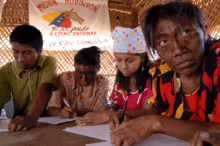Mission Robinson
| Missions of the Bolivarian Revolution of Venezuela |
| food — housing — medicine |
| Barrio Adentro · Plan Bolívar 2000 Hábitat · Mercal |
|---|
| education |
| Ribas · Sucre Robinson I · Robinson II |
| indigenous rights — land — environment |
| Guaicaipuro · Identidad Miranda · Piar Vuelta al Campo · Vuelvan Caras Zamora |
| leaders |
| Hugo Chávez · Nicolás Maduro |
Mission Robinson is one of the Bolivarian Missions (a series of anti-poverty and social welfare programs) implemented by Hugo Chávez in 2003. The name "Robinson" was given to the Mission in remembrance of the pseudonym adopted during his exile from Spanish America by Venezuelan philosopher and educator Simón Rodríguez (1769–1854).
The program uses volunteers to teach reading, writing, and arithmetic to Venezuelan adults who were illiterate. The program is military-civilian in nature, and sends soldiers to, among other places, remote and dangerous locales in order to reach the most undereducated, neglected, and marginalized adult citizens to give them regular schooling and lessons.
Statistics

On the first anniversary of Mission Robinson's establishment, and to an audience of 50,000 formerly illiterate Venezuelans, Hugo Chávez Frías stated in the Teresa Carreño theater in Caracas that “it was truly a world record, in a year we have graduated 1,250,000 Venezuelans". On 28 October 2005, Venezuela declared itself a "Territory Free of Illiteracy", having raised the literacy rate to 99% according to initial government statements that later changed to around 96%.[1] The program graduated 1.4m Venezuelans from the Mission. The standard for a country to be considered free of illiteracy being 95%.
According to Francisco Rodríguez of Wesleyan University in Connecticut and Daniel Ortega of IESA, there has been “little evidence” of “statistically distinguishable effect on Venezuelan illiteracy”.[1] The Venezuelan government claimed that it had taught 1.5 million Venezuelans to read,[2] but the study found that "only 1.1m were illiterate to begin with" and that the illiteracy reduction of less than 100,000 can be attributed to adults that were elderly and died.[1] Previous reports had claimed that the eradication of illiteracy had been UNESCO-verified. In October 2006, Venezuelan Education Minister Aristóbulo Istúriz clarified that Venezuela had not received a UNESCO certification because the organisation does not certify literacy programs . "Venezuela is a sovereign nation, Venezuela declares itself Illiteracy-Free Territory," affirmed the minister.
According to UNESCO, of Venezuelans aged 15 and older, 95.2% can read and write, one of the highest literacy rates in the region. The literacy rate in 2007 was estimated to be 95.4% for males and 94.9% for females.[3] In 2007 primary education enrollment was around 93%.[4]
References
- 1 2 3 "Propaganda, not policy". The Economist. 28 February 2008. Retrieved 3 May 2014.
- ↑ Márquez, Humberto (28 October 2005). "Venezuela se declara libre de analfabetismo" (in Spanish). Inter Press Service. Retrieved 29 December 2006.
- ↑ UNESCO, Education in Venezuela (Bolivarian Republic of)
- ↑ Venezuelanalysis.com, 27 January 2010, UNESCO: Education in Venezuela Has Greatly Improved
- ^ The Robinson Mission Venezuela (unesco.org)
External links
- Misión Robinson — Official government website.
.jpg)